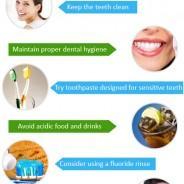
Tooth sensitivity can be a pain in the-well, within the mouth. Cold or hot foods and drinks, sugary sweets, a cold wind against your teeth could make your pearly whites start throbbing or stinging.
Lots of people in this world suffer needlessly due to pain from sensitive teeth. Sensitive teeth are usually brought on by worn tooth enamel, from acidic food and drink, tooth-grinding, and overly vigorous tooth-brushing.
Sometimes this sort of sensitivity can take weeks or even months disappear. In other cases, people can cause tooth sensitivity by habitually grinding their teeth or clamping their jaws tightly shut. This type of sensitivity to pressure isn’t something to bother with if it happens once or twice and disappears in a day or two.
The tooth or teeth simply need time for you to recover from the trauma. It’s once the pressure sensitivity is persistent that you ought to suspect something like a break, crack, or decayed tooth and really should see your dentist.
Reduce Tooth Sensitivity
In most cases, teeth are sensitive as their protective outer layers-enamel over the crown, or cementum within the root-have worn away. That exposes your tooth’s dentin, that is full of tiny tubes with sensitive nerve endings running through them. Following these steps might help reduce or even eliminate that trouble.
Keep the teeth clean
Plaque, the white gummy substance that forms on teeth, produces an acid that irritates teeth, particularly if your choppers are naturally sensitive. Wage a regular attack against plaque by brushing at least two times, preferably right after eating and especially before going to sleep, and flossing at least once.
Maintain proper dental hygiene
Properly flossing and brushing your teeth are the most important steps of maintaining your dental hygiene. Cleaning all parts of mouth thoroughly might help prevent sensitive teeth.
Try toothpaste designed for sensitive teeth
Several brands of toothpaste available on the market are designed to help people with sensitive teeth. Some pastes contain an energetic ingredient called potassium nitrate, which will help to block the tiny tubules in the dentin. They don’t work with everybody, but experts agree it’s normally the best place to start. Lots of times artists are using it just for a little bit, and then they stop. However, you need to continue to use it.
Avoid acidic food and drinks
Contact with red wine, pop, fruit juices and acidic foods-such as oranges and pickles-can place your enamel under constant attack. Limit these foods and drinks, and then try to brush about 20 minutes after eating them (not earlier, or even the brushing may hurt your enamel further). Even when your teeth aren’t yet feeling sensitive, it’s a good idea to become cautious about consuming certain foods and drinks, as enamel loss is irreversible.

Reduce Tooth Sensitivity
Consider using a fluoride rinse
Fluoride rinses, available without a prescription at the local pharmacy or in the dental portion of grocery stores, can help decrease sensitivity, specifically for people plagued with decay problems. Utilize it once a day. Swish it around inside your mouth, then spit it.
Change the way you brush
If you’re not utilizing a soft toothbrush, if you’re scrubbing your teeth vigorously, or maybe you’re not brushing for a full two minutes, then you’re not doing any favours for the sensitive teeth. Hard brushing can actually wear away enamel, enhancing the sensitivity in your teeth. If you have any recession of the gums or bone loss-and your tooth root is exposed like a result-then you’re also scrubbing at cementum. Cementum is supposed to protect the root of the tooth, but wears away even faster than enamel.
